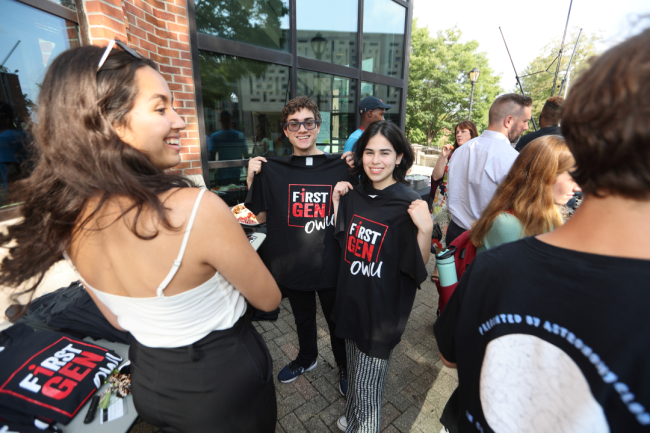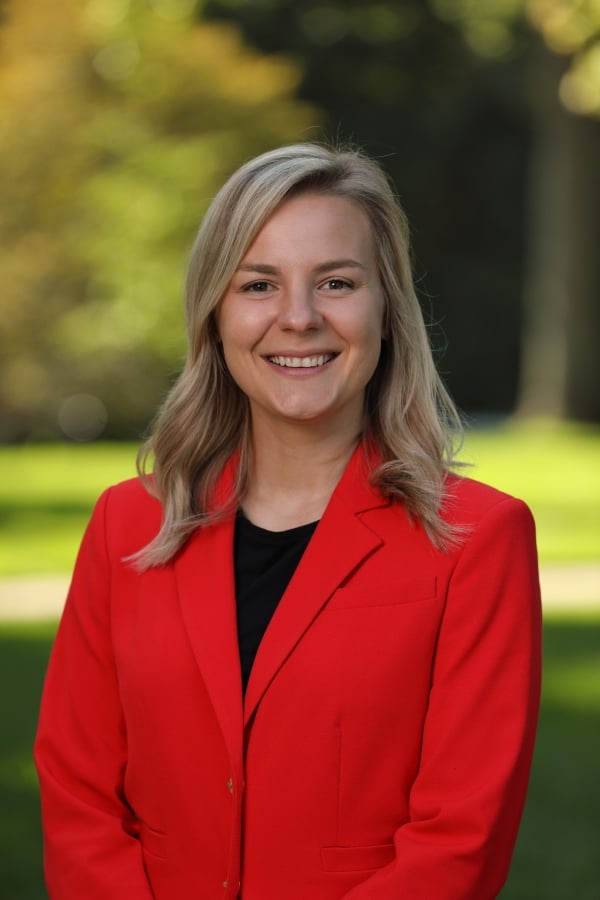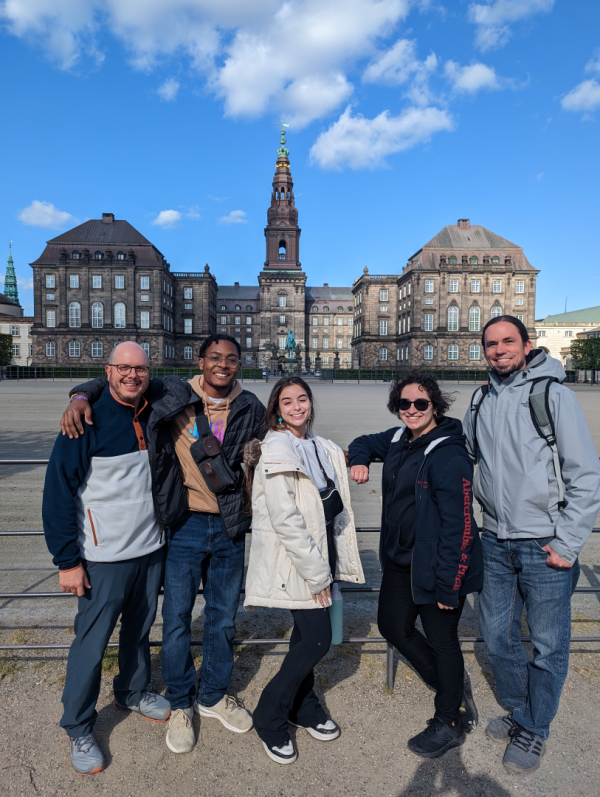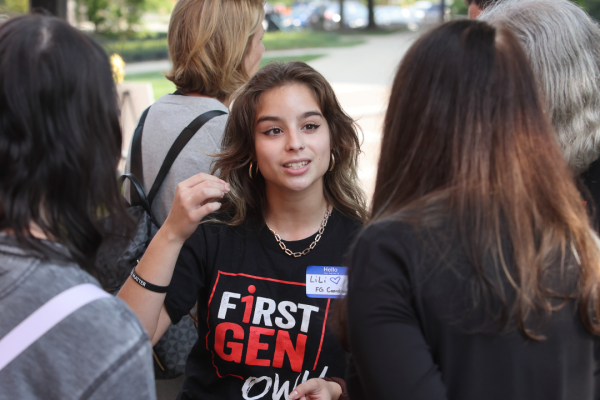You have /5 articles left.
Sign up for a free account or log in.

Ohio Wesleyan students celebrate being the first in their families to go to college as part of OWU’s annual first-generation celebration kickoff at the start of the academic year.
Paul Vernon/Ohio Wesleyan University
Ohio Wesleyan University is expanding its first-generation work, launching a formal office for first-generation learners and creating new initiatives for academic and career preparation.

Thea Smekens, director of first-generation success at Ohio Wesleyan University
Ohio Wesleyan University
First-generation students make up about 19 percent of Ohio Wesleyan’s student population, but previously the university did not have a dedicated office or staff for first-generation resources and support. Starting June 1, Thea Smekens joined OWU’s student services team as director of first-generation success, responsible for the Bishop Elevate office and programming, alluding to Ohio Wesleyan’s nickname for its students.
Ohio Wesleyan recently joined the National Center for First-generation Student Success’s First Scholars Network, offering best practices and national benchmarking for first-generation student success.
Smekens and Dean of Student Services Brad Pulcini spoke with Inside Higher Ed about the development of a dedicated first-generation-serving office, Smekens’s goals for the next year and student success for a first-generation learner.
Q: What is the history of Bishop Elevate and first-gen work at Ohio Wesleyan?
Pulcini: We have been working with first-gen students through an advisory council made up of faculty and staff for the last few years … but the work has caught the attention of the campus and our board of our alumni or Board of Trustees. So much so that when we were thinking about, “What can we do if we actually had full-time office support and a staff dedicated to this?” We had a couple of donors from our board step up and say, “Yes, let’s, let’s do this.”
The office that’s been established now [is] so we can have full focus on first-gen programming and initiatives and success and triage and follow-up.
Thea, who was hired as our first director of first-generation student success, can really start thinking about how the things that we started with the baseline from the advisory council and the work of others and build upon that into a systematic program and what that may look like at the institution.
Between the office and now between some of the funds and grants and everything that we have, it’s all coming together under this umbrella of Bishop Elevate. It will be a very visible brand for first-gen students on campus and will really systemize some of the work that we’ve been doing in first-gen student support and success here for the last few years.
Q: How has your career trajectory led you to this role?
Smekens: My background in higher ed is in housing and residence life—I worked professionally for nine years in housing and residence life.
I worked with a lot of first-generation college students when they were coming into the university and starting their journey with us. And most importantly, I worked with their parents and families. I learned early on in my career that the college experience for first-generation students and their families is really uncharted territory. It’s tough. If you think about first year, student move-in day [as housing staff], we’re really excited. Everyone’s wearing the right colors, like the staff, we’re saying the acronyms, and we’re talking about how you move in and get your key, and “Oh, you haven’t finished making your deposit yet? So we actually need you to fill this out. And we need your health forms.” It’s overwhelming.
I think, being able to witness that from a housing perspective, and being the person who helps students find their way on that very first day on campus with an ID and a key in the hand, I realized that that work has to start before [students] get to campus.
I worked previously here in housing at Ohio Wesleyan from 2015 to 2018. I worked with Brad a little bit doing some first-generation student work then. I started to settle into my first-generation graduate identity, because I was a first-generation college student as well. In my time as an undergraduate student, I never once thought about being first-gen as identity, and no one ever spoke to me about being a first-generation college student. I knew that it was more difficult for me than it was for my peers. But there really wasn’t a label, an identity, and there really wasn’t a path forward for me. Being able to come back to Ohio Wesleyan to do this work is meaningful.
I’m looking forward to working with the faculty and staff who are already in place, really dedicated to do this work as we define what student success means for first-generation college students, and as we really start to build the Bishop Elevate office and name.
Q: What does first-generation student success look like to you at Ohio Wesleyan?
Smekens: Thinking about the first-generation college student identity, and how that forms, it’s often in a nonilluminated pathway, right? There’s a lot of mystery around what it means to be a first-generation college student. And I think for those students, they’re just trying to figure it out repeatedly, every day. And there’s a lot of pressure for first-generation students to get it right. There’s a lot of internal pressure, and there’s a lot of external pressure, and without the right resources and supports in place, it’s just really, really difficult for those students to succeed.

First-generation Ohio Wesleyan faculty, staff and students visit Copenhagen (pictured in front of Denmark’s Parliament) and Berlin through a university-funded grant to explore factors that facilitate and impede social mobility, as well as the experiences of first-generation students that enable them to climb the class hierarchy.
Ohio Wesleyan University
We define success for first-generation students, we’re thinking first and foremost about graduation, right? Obtaining that four-year degree that they’re here to be the first in their family to achieve. There’s all of the success that has to happen from, as soon as they’re admitted and enrolled, up to graduation day.
Here at Ohio Wesleyan, we think about success, I think similar to the way we think about wellness: through a holistic lens. Thinking about students’ academic success, thinking about, do they have what they need from a well-being standpoint, financially? Are they connected here? Academic success compared to their peers and making sure they have the support that they need.
A good example is asking for help when it comes to tutoring. I think it’s hard to seek out help, especially as a first-generation student; we know that first-generation college students are resilient. This is not their first time doing something for the first time, right?
Seeking out help, maybe before they came to OWU, was maybe in high school, or if they’re struggling in a class, maybe it was just talking to one teacher, but how do you do that in a college setting? And how do you talk to a professor? Or how do you find a tutor?
And I think they might not have the support to call home and say, “I’m struggling with this class, I’m struggling with grades,” because, first of all, admitting that to parents or families might not be an option. But for their peers who, their parents and their family members went to college, being able to say, “Hey, I’m really struggling with this math class,” Mom or Dad might say, “Well, get a tutor.” But the language that students use with their families and their parents when they’re first-gen is just different.
Success really starts with their onboarding and helping them understand what’s in front of them in this journey that they’re about to embark on. It’s hard to expect them to be successful in terms of getting good grades and doing well on midterms and really crushing their first finals when there’s also so many other things that they have to figure out. Success is really complex for first-generation students, and it takes many offices on campus to really provide that wraparound support for first-gen students.

Amarilys “Lili” Torres-Nunez talks to other first-generation students at one of Ohio Wesleyan’s 2022–23 programs for first-generation students. Torres-Nunez is OWU’s first-generation student intern, planning programs and serving as a resource/mentor for other first-generation students.
Paul Vernon/Ohio Wesleyan University
Q: What are your goals within your first year?
Smekens: My first goal is to get to know our incoming and our upperclassmen first-gen students. You can talk a lot about community and connection, but I think being part of that is going to be important. Connecting with those students, hearing their stories, learning about where they’ve been and what they bring to Ohio Wesleyan.
Then thinking about our upperclassmen students, hearing about their experience, I think we’re going to have to build some of the program based off of what we find to be some of those services that might have more friction. And so how do we create more frictionless services for first-generation students here at OWU?
As we’re defining what success means and building the Bishop Elevate program, uplifting student voice and the student experience in developing this program is going to be so important.
In this first year, just immersing myself in the community with the students and as much as possible, connecting them to those resources, but also celebrating them. I think that it’s really important to celebrate them when they come, but I think as they’re leaving in their last year, it can be really, really difficult to be a senior and be a first-generation college student, when you’re getting ready to kind of cross that threshold and graduate. It’s scary, you’re trying to figure out, “What supports are in place for me here as a senior?” Thinking about, “How do we appropriately support and celebrate our graduating first-generation college students?”
I definitely have my work cut out for me—this is day five, I think. I’m excited to jump in.
Seeking stories from campus leaders, faculty members and staff for our Student Success focus. Share here.




